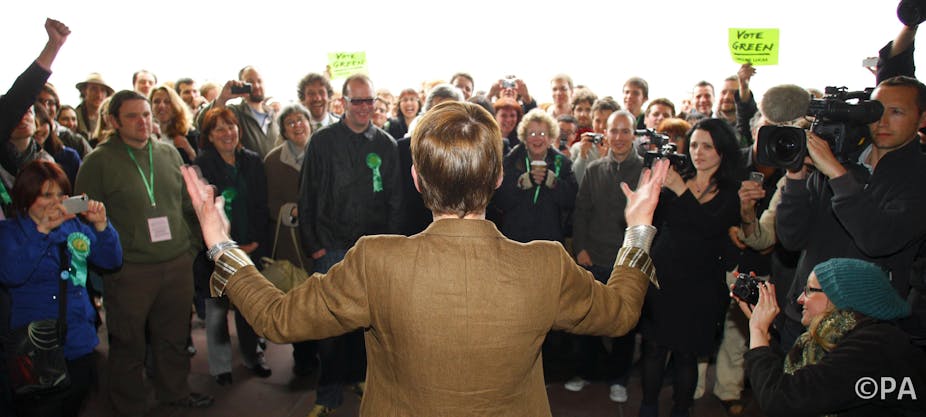The Green party recently reported a surge in membership, with 2000 new members in 24 hours. Now, the Scottish, English and Welsh, and Northern Irish Greens have accumulated almost 44,000 members between them. This makes them the fourth largest party in the UK behind Labour, the Conservatives and the SNP.
On the face of it, an increase in party membership seems like a good thing. But an increase in numbers, especially at this rate, does have the potential to cause issues for a party like the Greens.
A vital asset
Members are assets to a party’s leadership. For a start, they bring in – and are themselves – resources. Money is the most obvious benefit that a member brings to a party. Members will pay a fee each month towards their membership, and can be approached by their local branch to contribute to fundraising events and campaign activities. This is a vital resource for a political party when it comes to hiring staff, producing campaign materials and securing adverts.
Members may also contribute time and labour to their party. Some members will become very active by taking part in doorstep and telephone canvassing, delivering leaflets, and getting involved in awareness events such as street stalls.
Less active members will still be likely to talk to their friends and family about the benefits of voting for their party, and are likely to share information on their social media networks.

Increased membership also engenders legitimacy: parties with a burgeoning rank-and-file cannot be as easily dismissed as “extreme” or “a fringe movement”. For a party like the Greens, which is not affiliated with vested interests like trade unions or business organisations, the resources that members bring are crucial to the vibrancy, vitality and electoral success of the party.
Causing friction
For all their attractions, party members can also become liabilities. Both in the UK and internationally, Green parties pride themselves on their internal democracy. The Green parties have a very inclusive policymaking process when compared to most other parties in the UK. These features may be attractive to new members, making them feel included and valued.
But this inclusiveness also provides a platform for some members to pursue a policy strategy that could lose votes, leading to friction between grassroots activists and party leaders. Although new members will have noble intentions, they might lack the political experience to understand what sort of approach is most likely to gain the party votes.
An increase in membership will also inevitably lead to a marked increase in the number of individuals who wish to stand for election. This can lead to internal tensions, with more experienced activists feeling disillusioned and frustrated by the fact that their longer-term investment in the party is being undervalued and taken for granted by newer members.
Pragmatists v fundamentalists
Academic literature on Green parties suggests a fundamental tension at the heart of this party type is between so-called pragmatists and fundamentalists. This is common feature in parties of the left and mass-membership parties more generally: a divide between those who are willing to compromise on ideological purity in order to increase the chances of electoral success, and those who believe that doing so betrays the principles and ideology of the party.
The German Greens, for example, experienced a key strategic debate in the 1980’s between two such factions. Faced with an attractive political opportunity in the shape of seats in the German Bundestag, the Greens, over a period of time, shed their single-issue status to become a more professionalised political party.
With electoral success came pressure to continue and maintain this success which resulted in the party reforming some of its internal structures in order to professionalise its policymaking capacity. This created tensions within the party, famously leading one leader to state that the party was becoming “Eine Stinknormale Partei” - a perfectly ordinary party.
If the UK Greens win more seats in the House of Commons this year, or even make deals with a future minority government for policy concessions, the media spotlight will shine on them like never before. Any internal disputes over policy and strategy that arise will likely find their way to the front pages.
Though this membership increase is a largely positive development for the Greens, it has the potential to lead to problems. But as things stand, the Greens can look to the year ahead as the one that could signal a true electoral breakthrough for the party despite the notoriously uncompromising first-past-the-post electoral system.

